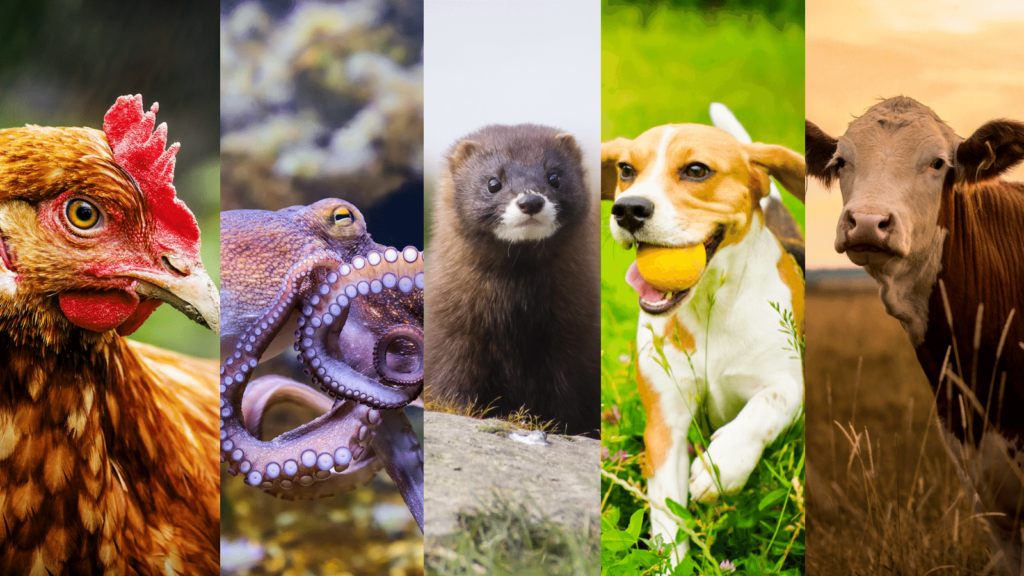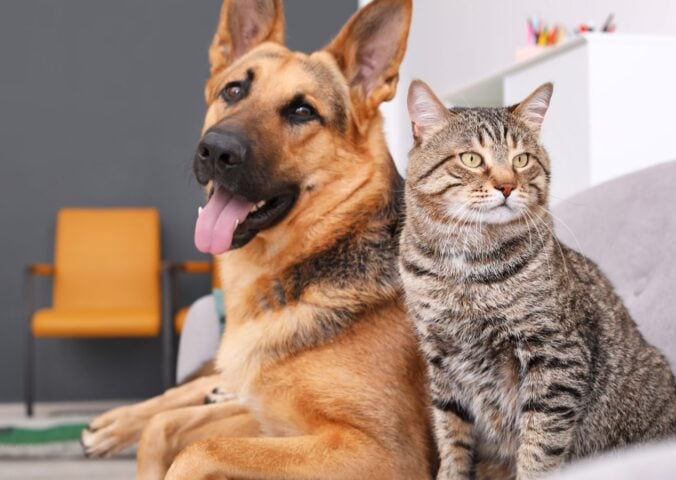2021 has come to a close, and what a year it was. It’s easy to get caught up in all the catastrophe that the last 12 months brought with it (and boy, was there a lot). While it’s important to acknowledge and honor those hardships, it’s equally worthwhile to look back at all the progress we saw throughout the year. And importantly, use that knowledge to propel us even further in 2022.
Society is far from where it should be in a lot of ways – including its treatment (and exploitation) of animals. There’s no denying we have a long way to go. But here are just some of the ways humankind stood up for animals in 2021.
And, may we progress even further in 2022.
Animal testing
- The European Parliament passed a historic resolution that calls on the European Commission to develop an action plan to end experiments on animals across the continent. And, introduce animal-free research in its place.
- Mexico became the first country in North America to ban animal testing for cosmetics.
- Five US states banned the sale of animal-tested cosmetics, meaning eight in total now have such a ban in place: California, Hawaii, Illinois, Maine, Maryland, New Jersey, Nevada, and Virginia.
- Major haircare brand TRESemmé pledged to ban animal testing on its products around the world, and gained cruelty-free certification.
- North America’s largest chocolate manufacturer, Blommer Chocolate Company, pledged to stop testing on animals. The 82-year-old company confirmed the ban after pressure from PETA.
- More than 1.3 million people signed a petition urging for dogs, cats, and monkeys to be allowed to “retire” after experiments into adoption, rather than be euthanized. The petition is still gaining traction (you can sign it here).
Animals used for entertainment and sport
- France made multiple historic decisions for animals this year. The country banned circuses from using captive wild animals. This means France’s 120 circus owners will not be able to use elephants, big cats, and bears, for example, in their shows.
Further, France outlawed the use of wild animals in television shows, nightclubs, and private parties. It also banned live dolphin shows and mink fur farming, forcing the country to close its last remaining mink farm.
Additionally, the French government raised the maximum penalty for animal abuse to five years in prison and a €75,000 fine. And finally, those wishing to purchase a pet must wait one week until taking the animal home. It’s thought that this measure will help prevent impulsive purchases, which can lead to the abandonment and mistreatment of animals. The UK welcomed animal rights legislation that prohibits big game hunters from bringing back the body parts of 7,000 species, including rhinos, elephants, lions, leopards, and polar bears. The bill is considered one of the toughest in the world.
- Leading travel company Expedia declared it would stop selling holiday packages that include captive dolphin, whale, and other cetacean shows. Seaside animal sanctuaries can still be advertised, as long as they do not offer interactions or performances.
Further, Expedia does not allow intentional physical contact with wild and exotic animals, like bears and big cats, or attractions that use animals as props (such as for selfies).
Activities centered around harming animals, like spearfishing and bullfighting, are prohibited. Expedia also banned “demeaning” wild animal performances, including for circus shows.
Legal recognition and sentience
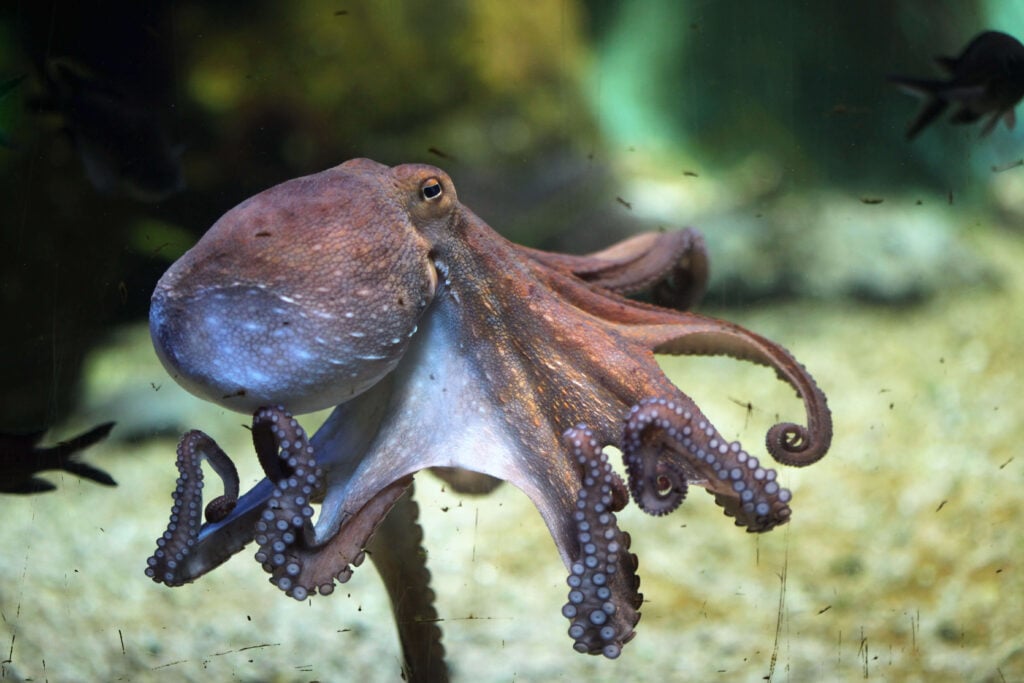
- In a momentous decision, the UK government officially recognized various sea animals as sentient. These include cephalopod molluscs (squids and octopuses, for example) and decapod crustaceans (like crabs, lobsters, and shrimp).
It came after an 80-page report reviewed more than 300 studies and found significant evidence of the animals’ sentience. Researchers defined sentience as having the capacity to not only feel pain, but experience feelings of joy, pleasure, comfort, stress, and excitement. Across the pond, in the US, animals were recognized as legal persons for the first time in a US District Court. Around 100 hippos were granted the rights to protect them from slaughter. The Colombian government had planned to kill the animals, who are descendants of the hippos imported by the infamous Pablo Escobar.
- Spain passed legislation that grants pets and wild animals more rights. Now, they will no longer be considered “objects.” Along a similar vein, Turkey passed a law that recognizes animals as more than just “commodities.”
Animals in the food system
- In July, Argentina became the first country in the world to effectively ban salmon farming. Environmentalists and animal rights advocates alike applauded the move, with Greenpeace naming it a “tremendous step towards protecting the ecosystem.”
Faye Lewis, head of communications at vegan charity Viva!, named salmon production a “reckless industry.” Lewis noted that Argentina’s ban “sets a real precedent for the rest of the world to follow.” The UK also made waves within the seafood industry last year, when it announced a “world-leading” ban on the shark fin trade – including imports and exports.
- Germany’s Cabinet approved a draft law to ban the mass culling of male chicks. The legislation would avoid the slaughter of around 45 million male chicks a year, estimates say.
Following a petition that garnered more than 1.4 million signatures, the European Commission announced plans to ban the use of cages in animal farming systems across the continent. This applies to cows, pigs, chickens, ducks, and geese, to name a few. It’s expected the legislation will impact more than 300 million farm animals a year.
- In November, the Welsh government unveiled its five-year plan to improve animal welfare across the country. The commitments include restricting the use of cages for farm animals, and installing CCTV in slaughterhouses. It’s hoped that surveillance systems will deter workers from mistreating farm animals, and ensure that other welfare standards at met for animals during their final moments.
Fur farms
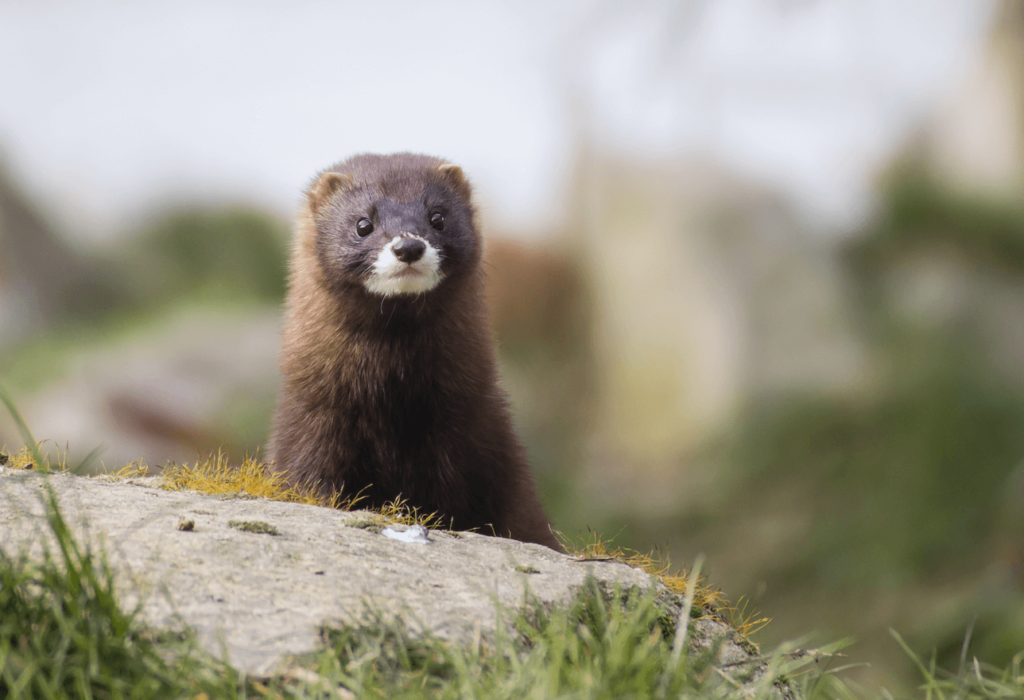
- As 2021 was drawing to a close, Italy made headlines when it announced plans to implement a permanent ban on fur farming. The ban protects animals like mink, foxes, chinchillas, and raccoon dogs from being bred for their fur. As such, the country’s ten remaining mink fur farms will be forced to shut down by June 30, 2022. Italy is now the 16th country in Europe to make such a move.
The announcement followed a similar pledge made by British Columbia (BC) in November. The Canadian province said it would phase out its mink fur farming trade over public health concerns – specifically, surrounding COVID-19. The breeding of mink and keeping the animals on farms will be prohibited by April 2023. Reportedly, the delay is to allow the province’s remaining nine mink farms to prepare for closure. All operations, including the sell off of all furs, must halt entirely by 2025.
Fur in fashion
- It could be argued that the downfall of fur is most prominent within the fashion sector itself. In December, ELLE, purported to be the largest fashion magazine in the world, announced a global ban on the promotion of fur. It’s said to be the first major fashion magazine to do so. The company pledged to never again advertise the animal product via any of its editorials, websites, social media pages, or images – online or in print. The ban applies to all of ELLE’s more than 30 editions around the globe.
A host of major fashion labels said goodbye to fur too. One of the world’s largest luxury fashion companies, Kering Group, dropped fur from all of its brands for ethical reasons. Gucci, Yves Saint Laurent, Alexander McQueen, and Brioni, to name a few, are all operated by Kering, which said going fur-free was “the right thing to do.”
- Canada Goose committed to removing coyote fur trim from its jackets, asserting that its “future is fur free.” The company added: “We believe that what we do matters, and how we do it is just as important. Also in 2021, Adidas permanently banned fur, and in doing so, became the 1,500th apparel company to join Fur Free Retailer.
Neiman Marcus – owner of luxury department stores like Bergdorf Goodman, Last Call, and Horchow – promised to stop selling fur, as did Saks Fifth Avenue, Valentino, and leading Canadian department store Holt Renfrew.
- Further, Armani Group – which heads brands like Giorgio Armani and Emporio Armani – banned Angora fur. And so did luxury fashion retailers Farfetch and Valentino.
Leaving leather behind
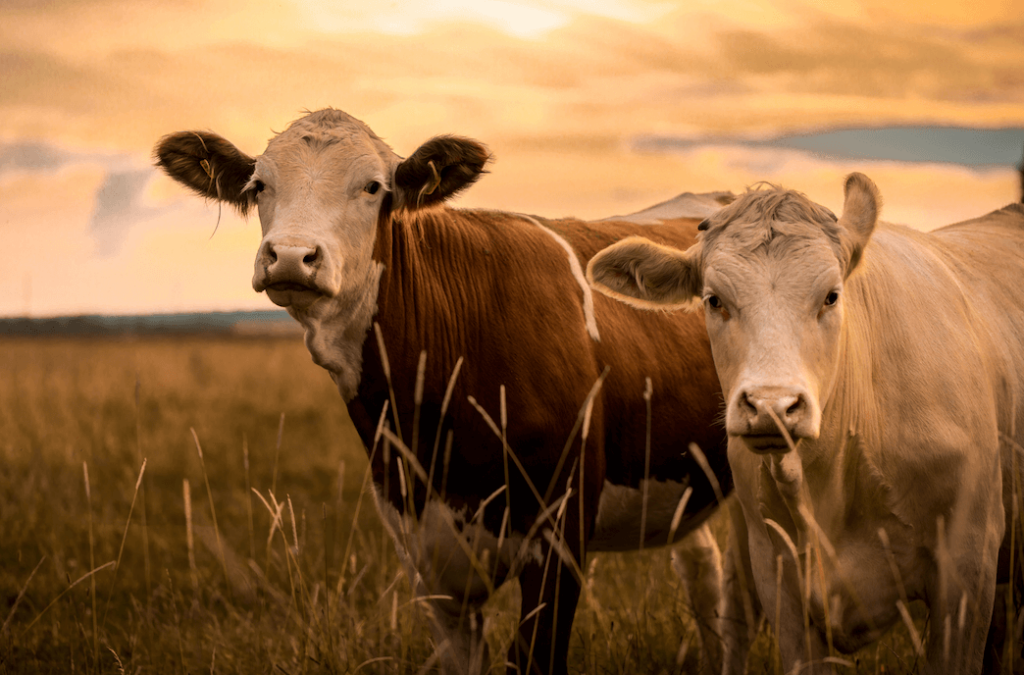
- Like fur, animal skins seem to be falling out of favor with the public too. In October, A-lister fashion house Altuzarra, which has been sported by names like Meghan Markle and Reese Witherspoon, confirmed a ban on exotic animal skins. The announcement followed pressure from PETA, which sent Altuzarra footage of animal cruelty in the snake and crocodile skin trade.
Shortly after, Danish brand Ganni revealed it was removing animal-based leather from its collections. Instead, the company will use plant-based leather made from grapes. Ganni is kicking things off with grape leather shoes, slated for a 2022 launch.
- In the automotive world, Volvo ramped up its sustainability efforts when it announced it was ditching leather interiors. The car manufacturer is exploring materials made from forestry byproducts, plastic bottles, and recycled corks in its place. Further, Volvo announced it was making its cars fully electric by the end of the decade.
Honorable mentions
- At the start of June, titan beauty brand The Body Shop announced it was removing all animal products from its lineup and going fully vegan. Lionel Thoreau, global brand director of the company, said the transition to veganism was a “natural next step for The Body Shop.”
“Thanks to our founder Anita Roddick, we were the first beauty company to fight against animal testing in cosmetics, and the first major global beauty brand to use cruelty-free musk in our fragrances. Vegan beauty is a critical next step in our sustainability and environmental endeavors,” Thoreau said.
On its website, The Body Shop elaborates on the importance of protecting animals. It writes: “If you’ve ever said hello to a dog, seen a nature documentary or a picture of a baby goat, you’ll know that animals are pretty special. They’re living breathing reminders that this planet wasn’t made only for us.
“Some of these creatures have been around long before us, propping up vast ecosystems. Lots of them know how to play, they feel fear, they suffer. Many of us understand this intuitively, but somehow animal products keep turning up in our beauty.”
- And finally, Veganuary 2021 helped start last year off the right way, when more than 580,000 people signed up to go vegan for January. As a result, more than two million animals’ lives were spared in just a month, a report by the organization found.
Veganuary 2022 is expected to be the biggest yet, and it’s not too late to join in.
Those interested can take the Veganuary pledge here.
